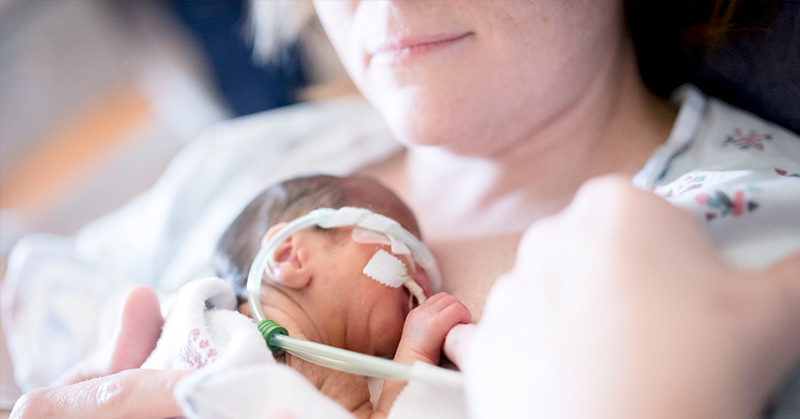Azizah Rowen gave birth to her son more than two months before his due date. At 30 weeks pregnant, she woke in the night to find that she was bleeding profusely. At the hospital, she was placed on full bed rest and told that she would have to deliver her son prematurely.
Rowen, who says she experienced several miscarriages and complicated pregnancies, was still shocked when her obstetrician (OB) told her she was losing too much blood for the baby to survive in the womb.
After successfully delivering her son in what Rowen described as an “anxiety-inducing” experience, her baby boy, named Wilder, was placed in an incubator in the NICU, where he would remain for the next 49 days.
Rowen describes how tiny her son was—four pounds—and how the sight of tubes coming out of his mouth and nose were “more terrifying than I could have imagined”. She recounts her own experience—“I was hysterical”—and saying that she was sure her baby would die.
At the NICU, short for Neonatal Intensive Care Unit, Rowen says the staff was composed of “the most incredible nurses”, who helped to keep her calm and assured her that her baby was in good hands. She says she learned so much during her time there, and while every day there was a new struggle, there were some days where she and her husband were confident Wilder would make it, while other times they were terrified and inconsolable.
Statistics on Premature and NICU Babies
Rowen, of course, isn’t alone. About 1 in 10 babies are born too early in the United States, and some statistics suggest the number is closer to 1 in 8. Premature birth is considered that before 37 weeks of pregnancy [1].
There are several reasons a baby may go in the NICU. The NICU isn’t just for premature babies—it’s also for babies that have health issues or even those that have undergone a difficult birth [2].
At the NICU, babies are cared for 24/7 by a team of experts. Worldwide, 15 million babies are born prematurely, and this number is growing [3].
Premature birth is the leading cause of death for children younger than the age of five. There are many reasons why a baby may be born early. Maternal health, age, and the number of babies (think twins or triplets) can increase the risk of premature birth, as can certain actions such as smoking, drinking, or using illegal drugs during pregnancy [4].
Mortality rates in the NICU vary by country but generally range from 4 percent to up to 46 percent [5].
How Having a Baby in the NICU Impacts Parents
It’s, of course, more than understandable that having a baby in the NICU would dramatically impact parents, and research has confirmed that this is true.
Mothers of premature babies are more likely than mothers of full-term babies to experience anxiety, depression, hostility, and fatigue as the result of their experience [6].
These parents learn that life can change in an instant, to make difficult medical decisions, to appreciate life, and to have the patience for the things that are ultimately beyond our control.
However, many parents are unprepared for the struggles of giving birth to a baby who is immediately whisked away to the NICU, most within 24 hours of their birth. These parents receive “Congratulations” messages, even during the hours when they’re not sure their baby will survive, and many NICUs are on the same floor as mothers giving normal births, and NICU parents have to see these parents leave with their healthy babies.
In addition, many of these parents will eventually return home at some point to shower and care for themselves—necessary tasks, but ones that require they leave their baby at the hospital. These parents aren’t prepared for leaving the hospital without their baby, which can be devastating.
In the NICU, the health and safety of the baby take priority, often leaving parents behind watching nurses take care of their infants. Research calls for the need for more physical and emotional closeness between parents and baby in the NICU, which can boost the well-being of both parents and child [7].
On what some parents call the “roller coaster” of the NICU, fear, anger, guilt, and powerlessness are all common emotions to have [8].
There’s no way for parents to prepare for the trauma of going through the experience of having their child in the NICU, and afterward, caring for a baby who has extra needs and challenges [9].
Rowen and Her Son Today
In the midst of taking care of herself and their other two-year-old son, Rowen and her husband spent their days at the NICU, making friends with the other parents and celebrating their babies “accomplishments”. The goal, as is the goal for most parents in NICUs around the world today, was for their babies to be healthy enough to come home.
Almost two months later, Wilder was able to come home. He’s now 19 months old, and while he was a compromised immune system and needs physical, occupational, and speech therapy, he’s otherwise healthy. Rowen says her son will need extra help until he’s three at least.
Rowen also shares she suffered from anxiety and post-traumatic stress, which is completely understandable given her situation. Like many mothers, Rowen blamed herself for not being able to carry Wilder to full term, even though she knew it wasn’t her fault.
Next Month Is NICU Awareness Month
September is NICU Awareness Month, which is designed to honor families who are experiencing a stay in the NICU, as well as the professionals who care for them [10].
You can support families in the NICU by doing favors for them—think grocery shopping, meals, or cleaning the house—listening, not trivializing the situation, following up once they’re home, and calling and visiting [11].
With anywhere from 43 to 78 babies for every 1,000 live births spending time in the NICU, there’s something each of us can do for families going through this unimaginably difficult experience [12].
- https://www.cdc.gov/reproductivehealth/features/premature-birth/index.html
- https://kidshealth.org/en/parents/nicu-caring.html
- https://www.who.int/news-room/fact-sheets/detail/preterm-birth
- https://kidshealth.org/en/parents/born-early.html
- https://www.sccm.org/Communications/Critical-Care-Statistics
- https://www.ncbi.nlm.nih.gov/pmc/articles/PMC5114875/
- https://www.ncbi.nlm.nih.gov/pmc/articles/PMC3468719/
- https://www.healthychildren.org/English/ages-stages/baby/preemie/Pages/Common-Parent-Reactions-to-the-NICU.aspx
- https://pediatrics.aappublications.org/content/138/3/e20160655
- https://www.nicuawareness.org/
- https://www.seleni.org/advice-support/2018/3/15/10-ways-to-help-nicu-parents
- https://jamanetwork.com/journals/jamapediatrics/fullarticle/2381545
- https://www.mother.ly/child/im-a-survivor-im-a-nicu-mama

